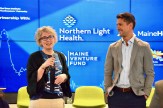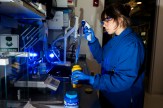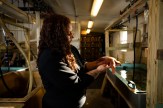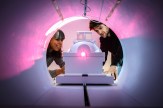Northeastern Professors Sridhar and Karma Elected to American Physical Society Fellowship
Srinivas Sridhar and Alain Karma, both Professors of Physics and College of Arts & Sciences Distinguished Professors, have been elected as Fellows of the American Physical Society (APS) for their exceptional work in their specific areas of physics research.
The focus of Professor Sridhar’s research is nanomaterials and nanomedicine, and his work has helped expand the understanding of physical phenomena in materials. The citation for which Professor Sridhar was elected recognizes his work with superlenses and high temperature superconductors, which could have potential applications in optical communications, electronics and power transmission. During his 21 year tenure at Northeastern, as well as in his present role of Vice Provost for Research, Professor Sridhar has worked to expand interdisciplinary research efforts across the University with the goal of translating research into practical applications.
“I am honored to be recognized by my colleagues for my contributions to understanding the physics of novel materials such as left-handed nanomaterials and superconductors,” said Professor Sridhar. “Physics is often referred to as the fundamental science, and at the same time as my research has explored fundamental phenomena, I also work to ensure that the basic research will be result in real-world applications.”
Professor Karma, who has been at Northeastern for 18 years, researches theoretical condensed matter and biological physics. The citation for which Professor Karma was elected recognizes his development of novel mathematical and computational approaches to further the fundamental understanding of pattern formation during crystal growth and his innovative dynamical theories of heart rhythm disturbances. Professor Karma’s simulation methods could lead to more energy efficient materials. His theories of heart rhythm disorders, in turn, have the potential to better identify and treat people at high risk for ventricular fibrillation, a lethal heart condition that kills 300,000 Americans each year. Karma is also working to foster interdisciplinary research on campus as director of the Center for Interdisciplinary Research on Complex Systems.
“I am grateful and honored that my research at the border of physics and other disciplines is being recognized by my peers,” said Karma, who will continue his research into energy related materials and cardiac arrhythmias. “The fact that my research might save lives one day keeps me highly motivated.”
The American Physical Society, founded in 1899, is the world’s leading group of physicists with the goal of helping the public by advancing physics through research and advocacy. There are currently 46,000 members in the APS, and each year, they elect only a very small number of their members as Fellows.
For more information on Professors Sridhar’s and Karma’s research, please contact Jenny Eriksen at 617-373-2802 or at j.eriksen@neu.edu.
About the American Physical Society Fellowship Program
The APS Fellowship Program was created to recognize members who may have made advances in knowledge through original research and publication, or made significant innovative contributions in the application of physics to science and technology. They may also have made significant contributions to the teaching of physics or service and participation in the activities of the Society. Each year, no more than one half of one percent of the Society membership are recognized by their peers for election to the status of Fellow in The American Physical Society.
About Northeastern
Founded in 1898, Northeastern University is a private research university located in the heart of Boston. Northeastern is a leader in interdisciplinary research, urban engagement, and the integration of classroom learning with real-world experience. The university’s distinctive cooperative education program, where students alternate semesters of full-time study with semesters of paid work in fields relevant to their professional interests and major, is one of the largest and most innovative in the world. The University offers a comprehensive range of undergraduate and graduate programs leading to degrees through the doctorate in six undergraduate colleges, eight graduate schools, and two part-time divisions. For more information, please visit www.northeastern.edu.





